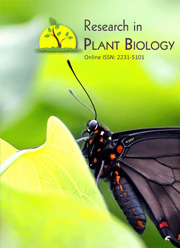Indigenous knowledge and utilisation of Khajuri plant (Phoenix Sylvestris Roxb., Arecaceae) in Bhadrak district, Odisha, India
Abstract
The study was conducted within the course of two years (2011–2013) to explore the indigenous knowledge and traditional utilization pattern of wild date palm (Phoenix sylvestris Roxb.) in Bhadrak district of Odisha, India. The objective of the study was to document indigenous knowledge and traditional handicrafts in order to suggest appropriate conservation and management strategies. The information was gathered largely from literature as well as field collected data and interviewed informants. A brief questionnaire, referring to the vernacular name, plant description, details on their use has been prepared and applied. Khajuri plant (Phoenix sylvestris Roxb. Arecaceae) is a long-lived monocotyledonous medium-sized slow growing plant species, found abundantly in road side, wasteland, around homesteads, crop fields, pond and canal bank. The leaves of the plant are used in many religious and socio-cultural functions in the district. This plant has been instrumental for landless traditional craftsmen in providing a substantial livelihood through their own indigenous wisdom in every stage of the palm’s maintenance from collection to the processing of products. Collected data show how ecological, geographical features and different cultures are related with the traditionally used handicrafts. Protection and conservation of this plant and some selective habitat is warranted where this species can grow undisturbed.



 .
. 